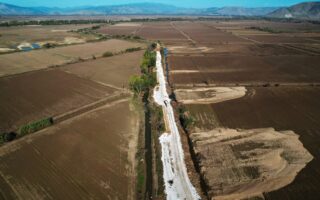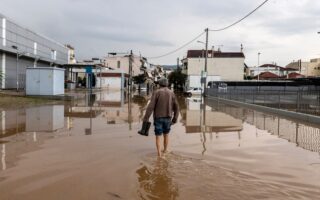Another tough summer lies ahead – it won’t be the last

The real question for the Mediterranean and, by extension, Greece, is not whether the coming summer will be hotter than last year’s, but whether it will be cooler than the previous one. If, that is, the increasingly high temperatures that have been recorded for several years in a row represent a passing climate disturbance or are a systematic trend.
The answer is pretty obvious. A recent study by the University of Athens found that the temperature has been increasing steadily since 1950 to the present, with this rise accelerating in the 30-year period between 1990 and 2020. It is also a trend that will last for many more years to come.
The study additionally confirmed:
• A drop in rainfall in many parts of Greece, and especially in the central mainland and further south. There has also been a reduction in snowfall, which is even more alarming, as small amounts of snow in the winter usually lead to much more dangerous wildfires in the summer.
• A reduction in ground moisture, especially on Crete, the southern Aegean, Attica and Central Greece, which is the result of less rain and more heat that aids evaporation.
• An increase in the frequency and duration of heatwaves, especially in the region of Thessaly and further south.
This is the “new normal,” a mix of conditions (drought and heat) that may not be the direct cause of wildfires (humans are the cause, either by intent or through negligence) but which do make them more dangerous and harder to put out. This has devastating consequences on the natural environment, on historical monuments inside or near forests, on farming and livestock, on everything to do with the outdoors more generally. These consequences also have an immediate impact on tourism and on local growth.
It is also essential that successive administrations stop handing out pardons for buildings and settlements illegally erected inside or on the fringes of forests
As to what needs to be done to deal with this new normal, bolstering our firefighting systems goes without saying, but the focus should always be on prioritizing prevention. This starts with simple measures like clearing brush and other combustible material in communities and forests (progress has already been made thanks to the Environment Ministry’s Antinero initiative), as well as keeping up with the maintenance of electricity grid infrastructure. It also entails more demanding measures such as evacuation plans (80% of Greek citizens don’t know what the evacuation plan is for their municipality) and a framework for coordination between all the different levels of the administration.
Priority must also be given to measures that look beyond the coming summer and address long-term needs such as, for example, protecting the country’s Natura areas with management plans (30 years after they were declared part of the network, only a few dozen of the country’s 400 protected zones have such plans). It is also essential that successive administrations stop handing out pardons for buildings and settlements illegally erected inside or on the fringes of forests.
Based on the picture that is taking shape, adapting to the impacts of climate change demands a radical overhaul or improvement of regional plans, as the climate risks are growing at a much faster pace than the administration’s and society’s ability to respond to them. It is also essential that preventive measures are introduced for those risks that are not yet critical, such as those connected to food security and safeguarding the economy.
How long this new normal persists, meanwhile, depends on how long the world as a whole continues to rely on fossil fuels, which contribute to the problem. And even if they were to stop using them tomorrow, it would take several more years for the situation to start improving. Even though there are solutions to this issue, the international community has, unfortunately, not responded to the degree that it ought, allowing fossil fuels to continue dominating even in countries that are hailed for their pro-environment policies, like Norway, Australia and Britain.
In the case of the climate, time is anything but an ally.
Constantinos Kartalis is a professor of environmental physics at the University of Athens and a member of the European Scientific Advisory Board on Climate Change.





